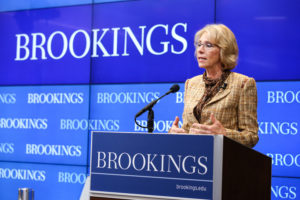House and Senate leaders successfully negotiated a $1 trillion federal spending package to fund the government for the rest of the fiscal year. Democrats immediately claimed victory, but Republicans touted progress.
The mammoth legislation is 1,665 pages and provides spending instructions for every agency of the sprawling federal government and comprises the 11 unfinished fiscal 2017 appropriation bills.
President Donald Trump signed the bi-partisan measure, choosing to avoid a federal government shutdown over advancing his budget priorities outlined earlier this year, while celebrating increases in defense spending and border security. The omnibus provides an annualized total of $1.07 trillion in base spending for fiscal 2017, or $1.16 trillion including Overseas Contingency Operations funding.
If you have not found time to review the newly minted legislation, then here are some important highlights:
Agriculture
In total, the bill allows for $153.4 billion in both discretionary and mandatory funding –$12.8 billion above the fiscal year 2016 enacted level. This net increase is related to mandatory spending, but discretionary funding alone provided by the bill is $20.88 billion.
The bill provides more than $1 billion to help farmers, ranchers, and private forest landowners conserve and protect their land. This includes $12 million for infrastructure rehabilitation to help small communities meet current safety standards for watershed projects.
The bill provides $6.35 billion in discretionary funding for Women, Infants and Children (WIC), which is the same as the fiscal year 2016 enacted level. Because of robust prior-year funding and declining enrollments in the program, WIC has record levels of carryover balances left over from previous years, so the bill rescinds $850 million of these unobligated balances, which will have no impact on participation in the program.
The bill provides for $22.8 billion in required mandatory funding for child nutrition programs. This is $644 million above the fiscal year 2016 enacted level. This funding will provide free or reduced-price school lunches and snacks for 31 million children who qualify for the program.
The bill provides more than $627 million for the Summer Food Service Program to ensure low-income children continue to receive nutritious meals when school is not in session.
The bill provides for $78.5 billion in required mandatory spending for the Supplemental Nutrition Assistance Program (SNAP). This is $2.4 billion below last year’s level, reflecting declining enrollment. The total includes $3 billion for the SNAP reserve fund, which is used to cover any unexpected participation increases.
The bill also stops an Obama-era school meal regulation from being implemented – providing flexibility for whole grains and milk and preventing changes to sodium standards that have not been fully scientifically vetted.
Justice
The bill funds Department of Justice at $29 billion, a reduction of $143 million below the fiscal year 2016 enacted level. Within this funding, priority is given to critical activities that protect the safety, rights, and property of individuals and families across the nation.
The Drug Enforcement Agency is funded at $2.1 billion – $23 million above the fiscal year 2016 enacted level. Within the DEA, priority is placed on anti-opioid and other illegal drug enforcement efforts. This includes $12.5 million in funding for four new heroin enforcement groups to target growing heroin abuse and availability in the U.S.
Funding for the Executive Office of Immigration Review is increased by $20 million, for a total of $440 million. This increase will provide for 10 additional immigration judge teams to process immigration reviews more quickly, and reduce the backlog of pending cases. The legislation also requires monthly reporting on immigration judge performance.
Defense
In total, the bill provides $593 billion, an increase of $19.9 billion over the fiscal year 2016 enacted level and $16.3 billion more than the Obama Administration’s request. This includes: $516.1 billion in base discretionary funding – an increase of $2 billion above current levels; and $76.6 billion in Overseas Contingency Operations /Global War on Terrorism funding. This amount includes $14.8 billion in new funding requested by the Trump Administration.
When combined with the $5.8 billion in supplemental funding enacted in the Continuing Resolution that passed in December, the total Defense funding for fiscal year 2017 is $598.5 billion, an increase of $25.7 billion over fiscal year 2016 and $22.1 billion more than President Obama’s original request.
The bill rejects the Obama Administration’s proposed troop reductions. Instead, the bill provides increases above fiscal year 2016, including funds for an additional 1,000 active-duty Army soldiers, 1,000 Army National Guard soldiers, 1,000 Army Reserve soldiers, and 1,000 active-duty Marines. The bill also provides funds to maintain a Combat Aviation Brigade in Korea.
Nuclear Security
The bill provides a total of $12.9 billion for nuclear weapons security programs, including Weapons Activities, Defense Nuclear Nonproliferation, and Naval Reactors – a $142 million increase above the fiscal year 2016 level and a $63 million increase above President Obama’s budget request.
This funding will uphold the nation’s nuclear deterrence posture, maintain the safety and readiness of our weapons stockpile, and allow the U.S. to meet any nuclear threat. The bill rejects the Obama Administration’s proposal to accelerate nuclear weapons dismantlement.
Energy
Funding for energy programs within the Department of Energy is $11.28 billion – an increase of $257 million above the fiscal year 2016 enacted level and $1.1 billion below President Obama’s request.
Within this total, the bill prioritizes and increases funding for energy programs that encourage U.S. economic competitiveness and that help advance the nation’s goal of an “all of-the-above” solution to energy independence.
Research and development projects to advance coal, natural gas, oil, and other fossil energy technologies, which will help the country make greater use of our rich natural energy resources and help keep down energy costs, are funded at $668 million – an increase of $36 million above the fiscal year 2016 enacted level. The bill reflects the national importance of these projects, and rejects the previous Administration’s proposal to reduce new funding for these accounts.
Renewable energy programs, which have already received significant investments in recent years, are cut by $808 million compared the Obama Administration’s budget request.
Also included is $230 million – $24 million above the fiscal year 2016 level – for research and development activities to strengthen the security of our electric grid against cyberattacks and extreme weather events.
Internal Revenue Service
The bill provides $11.2 billion for the IRS – freezing the agency at the fiscal year 2016 enacted level and $1 billion below the Obama Administration’s budget request. This holds the agency’s budget to below the 2008 level, but provides sufficient resources to perform its core duties.
Securities and Exchange Commission
Included in the bill is $1.6 billion for the Securities and Exchange Commission (SEC), which freezes the SEC at the fiscal year 2016 enacted level and is $176 million below the President’s budget request. The bill focuses this funding on critical information technology initiatives and its economics division which reviews SEC rulemakings.
The bill rescinds $25 million from the SEC’s “reserve fund” – a slush fund created under Dodd-Frank from which the SEC can freely spend without congressional oversight.
Executive Office of the President
The legislation contains $709 million for the EOP, which is $17 million above the fiscal year 2016 enacted level. The bill denies the President’s proposed cuts of $80 million to drug control efforts, including the High-Intensity Drug Trafficking Areas (HIDTA) and Drug-Free Communities programs, and instead increases funding for these programs by $9 million above the fiscal year 2016 enacted level.
The bill also includes a requirement that the Office of Management and Budget release information on the expected costs of Executive Orders and Presidential Memorandums.
Homeland Security
The bill contains $11.4 billion in discretionary appropriations for Customs and Border Protection – an increase of $137 million above the fiscal year 2016 enacted level. These resources ensure the nation’s borders are protected by putting boots on the ground, improving technology, and stemming the flow of illegal activities in and out of the country.
In addition, to meet emerging needs at the border, the legislation provides $772 million in funding as requested by President Trump in his March 2017 budget amendment for improvements to and maintenance of existing infrastructure, technology investments, and increased Border Patrol agent hiring.
The bill provides $6.4 billion for Immigration and Customs Enforcement – $550 million above the fiscal year 2016 enacted level. This includes $617 million – $380 million in base funding and $237 million in supplemental funding – for additional detention beds and transportation and removal costs.
Hacking and cyberattacks cost the federal government billions of taxpayer dollars, and expose the personal information of thousands of Americans. To help prevent these breaches in the future, the bill includes a total of $1.8 billion for the National Protection and Programs Directorate – $183 million above the fiscal year 2016 enacted level – to enhance critical infrastructure and stop cyberattacks.
The bill provides $2 billion for the U.S. Secret Service – an increase of $112 million above the fiscal year 2016 enacted level. This will increase investments in investigations and cybersecurity, and continue funding for the National Center for Missing and Exploited Children, which the Obama Administration proposed to eliminate.
The bill includes $7.8 billion for TSA – an increase of $331 million above the fiscal year 2016 enacted level.
This also includes $131 million for additional costs related to presidential protection demands.
Environment
The bill funds the EPA at $8.06 billion, a reduction of $81.4 million below the fiscal year 2016 enacted level and $209 million below President Obama’s budget request. Within this total, the EPA’s research and regulatory programs are reduced by $52 million below the current level and over $300 million below the previous administration’s request.
The bill provides an additional $7.5 million to accelerate the cleanup of Superfund sites. The legislation rejects the Obama Administration’s proposed increase in staffing, holding the EPA to the current capacity of 15,000 positions, the lowest since 1989.
It supports recent Executive Orders to encourage economic growth by providing flexibility for the Administration to review and rewrite the “Clean Power Plan” and other environmental regulations.
Health and Human Services
The bill includes a total of $73.5 billion for HHS, an increase of $2.8 billion above last year’s enacted level and $3.8 billion above the Obama Administration’s budget request. The legislation targets funds to effective, proven programs that help improve health, safety, and quality of life for Americans.
National Institutes of Health (NIH) – The bill provides a total of $34 billion for the NIH, $2 billion above the fiscal year 2016 enacted level. It includes specific increases for research related to Alzheimer’s disease, the brain, antibiotic resistance, and the Precision Medicine Initiative.
Centers for Disease Control and Prevention (CDC) – The legislation prioritizes funding for critical disease prevention and biodefense activities. The agreement includes a total of program level of $7.3 billion for the CDC – $22 million above the fiscal year 2016 enacted level. This includes $6.3 billion in appropriated funds, as well as $891 million in transfers from the Prevention and Public Health Fund. The bill includes $112 million – $42 million above the fiscal year 2016 enacted level – to expand efforts to combat prescription drug abuse.
Education
The bill funds the Department of Education at $68 billion, which is $1.2 billion below the fiscal year 2016 enacted level and $2.3 billion below the Obama Administration’s budget request.
Special Education – The bill includes $12 billion for IDEA special education grants to states, an increase of $90 million over the fiscal year 2016 enacted level, which will maintain the federal share of special education funding to states.
Student Support and Academic Achievement State Grants – The bill includes $400 million for a newly authorized grant program that provides flexible funds to states and school districts to expand access to a well-rounded education, improve school conditions, and improve the use of technology.
Pell Grants – The maximum Pell Grant award is increased to $5,920, funded by a combination of discretionary and mandatory funds. The bill rescinds a portion of Pell Grant surplus funds.
Impact Aid – The bill provides over $1.3 billion for Impact Aid, an increase of $23 million above the fiscal year 2016 enacted level.
Corporation for National and Community Service (CNCS) – The bill includes $1 billion for CNCS, $65 million below last year’s enacted level.
Corporation for Public Broadcasting (CPB) – The bill provides an advance appropriation of $445 million for CPB for fiscal year 2019, which is the same level of advance funding provided in the fiscal year 2016 enacted level and the Obama Administration’s budget request.
State Department
The bill contains a total of $16.1 billion in base and OCO funding for operations of the State Department and related agencies, as well as diplomatic efforts to enhance peace and stability around the globe. This is a decrease of $92 million below the fiscal year 2016 enacted level and $683 million below the Obama Administration’s request.
Within this amount, the legislation provides the full amount requested for embassy security at $6.1 billion, $455 million above the fiscal year 2016 enacted level. These funds will address needs at more than 275 diplomatic facilities overseas, including facility upgrades and security personnel as recommended in the Benghazi Accountability Review Board report.
To meet these and other needs, the bill reduces funding for assessed payments to the United Nations (UN) and international organizations by $640 million compared to the fiscal year 2016 enacted level.
Transportation
The bill includes $19.3 billion in discretionary appropriations for the Department of Transportation for fiscal year 2017. This is $681 million above the fiscal year 2016 enacted level and $6.2 billion below the President’s request. In total budgetary resources, the bill provides $77.1 billion to improve and maintain our nation’s transportation infrastructure.
Housing
The legislation includes a net total of $38.8 billion for the Department of Housing and Urban Development, a $513 million increase above the fiscal year 2016 enacted level, and $824 million below the request.
Section 8 and Public Housing – Included in the bill is $27.5 billion for Public Housing. This is an increase of $623 million above the fiscal year 2016 enacted level and $760 million below the requested level. This level will continue assistance to 2.2 million low-income households.
Community Development Block Grants are funded at $3 billion – the same as the fiscal year 2016 level.
The HOME Investment Partnerships Program is funded at $950 million – the same as the current year.
Grants for Homeless Assistance are funded at $2.4 billion, an increase of $133 million over current level – which will not only renew high performing housing programs, but further the goal of ending homelessness.




